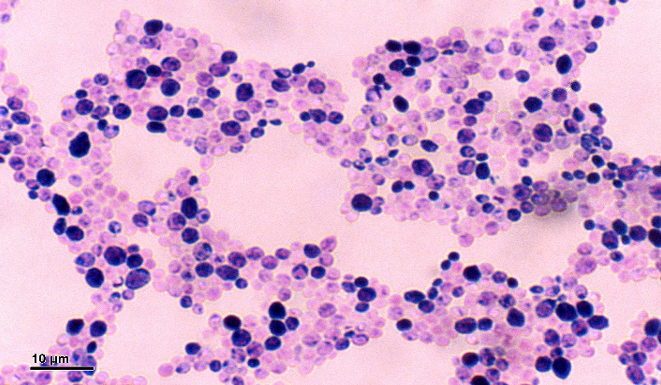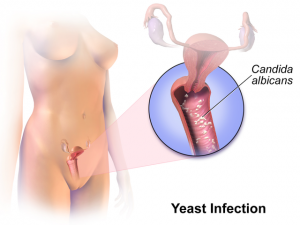
Oral thrush is a mycotic – that is, fungus-caused – infection of the mouth which is usually a result of the overgrowth of a type of yeast called candida albicans. Since most people already have candida in their mouths, it’s not contagious, and it can usually be treated with antifungal medications.
The same fungus that causes oral thrush is responsible for vaginal yeast infections; it’s natural, then, to wonder whether there might be a connection between the two, and whether or not candida is transmitted from mouth to vagina – or the other way around – via oral sex.
Thrush isn’t contagious, but candida may spread
While oral thrush in itself isn’t contagious, candida albicans may spread from one part of the body to another, as well as from person to person.
The clearest case of such transmission is from mother to child during normal birth. If the mother has a yeast infection, the newborn baby may develop oral thrush after coming in contact with the fungi in the mother’s vagina. However, studies have yet to show a significant correlation between the strains of candida in the mother and in the child. While sometimes they’re the same, there are also many cases where the two candida colonies belong to decidedly different strain, showing that they’ve come from different sources.
Oral thrush, yeast infections and oral sex
Candida albicans may also spread from vagina to mouth via oral sex, but this does not necessarily lead to oral thrush. Again, it’s important to remember that candida is not thrush, and that most people already have candida albicans in their mouth. In this circumstance, it’s not until their bacterial flora gets disrupted that oral thrush develops. This usually occurs as a result of a weakened immune system, so it’s not directly linked to coming in contact with candida colonies.
In short, candida may move from vagina to mouth, but it will only lead to thrush if the recipient was likely to get thrush in the first place. Without a weak immune system, a healthy adult will probably not get thrush even if they’d perform oral sex on an infected person.
Recurrent yeast infections and oral thrush
 As we’ve seen above, healthy adults may not get thrush even if they come in contact with a vaginal yeast infection. Obviously, the reverse is also valid: vulnerable individuals are likely to get thrush if they engage in oral sex with an infected person.
As we’ve seen above, healthy adults may not get thrush even if they come in contact with a vaginal yeast infection. Obviously, the reverse is also valid: vulnerable individuals are likely to get thrush if they engage in oral sex with an infected person.
In such cases, the vulnerable partner is likely to experience repeated bouts of thrush or other yeast infections, while the other partner may be perfectly healthy.
To avoid such repeated infections, a possible solution would be to not engage in unprotected sex of all types, and to have the healthy partner treated for candida as well. Why they may not exhibit thrush or other yeast infections symptoms, chances are that they carry high numbers of candida organisms, too.
Conclusion
While thrush may not be contagious, candida colonies may spread from vagina to mouth, thus leading to different yeast infections. Bear in mind that your vulnerability plays an important part in whether or not you’ll develop any candidiasis – that is, if your immune system is strong, you’ll probably not get any even if you engage in oral sex with a person who is infected.
However, if you are vulnerable, you’ll likely get a mycosis. To avoid any unpleasant symptoms, it’s always better not to engage in oral sex if your partner shows any signs of yeast infection. You may also want to take some anti-fungal treatment if your partner experiences repeated candida infections, as you may also be carrying high numbers of candida albicans.
Resources:
https://www.verywell.com/vaginal-yeast-infections-oral-thrush-and-oral-sex-3133055
http://goaskalice.columbia.edu/answered-questions/yeast-infection-thrush-oral-sex
http://www.thebody.com/h/is-thrush-connected-to-vaginal-yeast-infection.html/

